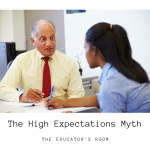I never found school boring when I was in high school. Challenging and frustrating? Yes, but never boring. So it always comes as a bit of a shock to me when students tell me how boring they find their high school classes today. The interesting thing about boring, of course, is that boring tends to mean irrelevant. My students ask, “what’s the point of learning this,” or “when will this be useful later?” I get it. I know that I paid attention in school because I liked learning. For me, school was never boring. For my students, it can be. So what are some ways that I, as an educator, can make my classes dynamic and interesting, while not sacrificing the integrity of my lessons?
Management Tricks
As I was researching this topic, there were several things that popped up in the management arena. Things like an over-reliance on lecturing, too much stationary work, and a lack of student interaction are all things that can lead to student boredom. Lectures are fun for some students, but frustrating for others. Student interaction can lead to more buy-in, and being able to move can help some students who might be a little twitchy.
I try to spice up my lectures with lots of movement, discussion, and other things to get students more invested in what we’re talking about. For example, when teaching Lord of the Flies, my students do the “Kill the Pig” dance. This shows the mob mentality that the boys succumb to. This activity not only puts my students in the space of those characters but also makes them get up and move a little bit. This keeps them engaged in what we’re doing.
Standardized Testing
There is an attitude that only reason to learn things in schools these days is to pass the standardized tests, and a lot of people fall into this trap. The tests are important, and so we adjust our teaching accordingly. This makes school boring for many students. It can mean that the only incentive to do well in school is to take the test, so anything else is useless. If students don’t care about the test, why would they care about school in general? For many of them, they don’t care. This cuts down student incentives to learn, making it boring.
With the increasing focus on standardized testing, teachers are being boxed into teaching towards the test. This is not new information. We have all seen this in a variety of ways. We are not being allowed to teach the way that we like to teach if we are training our students to take a test. When we are bored, our students are going to be bored. Try as I can, I cannot get excited about teaching my students how to take tests. I don’t know how to fix that, but I know I need to. Student buy-in is higher when a teacher is engaged in the subject. Altogether, this teaching to the test decreases student engagement and increases student boredom.
Teaching Style
One of the things that at least one article mention as something that many students find boring is worksheets. Now, I don’t think that this article is suggesting that we ditch worksheets altogether. The problem with most worksheets, they argue, is that they cover content at a superficial level.
So, our worksheets should be a supplement or a form of assessment. My unit on Animal Farm or Macbeth should be more than the worksheets. The worksheets help with understanding. However, it’s the class discussion and the essays that show that understanding even more clearly. Now, I know that worksheets are different for English than for math. But I think that the principle holds.
Some students are bored because they aren’t being challenged enough. Others are bored in school because it is too challenging, and their brain puts up a block. This is one of those things that, as a teacher, I just have to watch for. I try to identify which is which and adjust instruction accordingly. Some students don’t like it, but they all need to be challenged.
The other way to keep students engaged is to make things relevant. A 2007 study found that 60% of students did not see value in the things that they were being taught. Maybe we do need to have that dialogue. As tempting as it is to just say, “Because I told you,” answering seriously might help students feel more invested in what they’re learning. Why do they need to know these math equations? Here’s why. Why is it important to understand how to read things critically? Here’s why. That seems to help.
Final Thoughts
Huffington Post did a survey in 2014 on Twitter, asking students why they were bored in school. Commonly mentioned were things like “too much text on a PowerPoint,” “long videos,” “not relevant to my life,” and “not interactive.” Students want to be engaged in their learning, and they want it to be something that they can relate to. As a teacher, it is my job to make sure that students leave my classroom ready for the next step. Being bored out of their minds and hating my subject is not the way to do that. My teaching needs to be relevant to my students, and not be just a lecture.







As a student, I fall asleep during social studies, for there is no point.